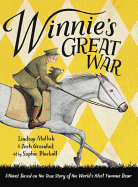
 Generations of children have fallen in love with A.A. Milne's Winnie-the-Pooh. Ninety years after Pooh's publication, Lindsay Mattick and Sophie Blackall's Caldecott-winning picture book Finding Winnie taught thrilled children (and adults) the history of that silly old bear: on his way to the war in 1914, real-life veterinarian Harry Colebourn adopted a black bear cub in Canada. This bear eventually wound up in the London Zoo, where she met young Christopher Robin Milne and his father.
Generations of children have fallen in love with A.A. Milne's Winnie-the-Pooh. Ninety years after Pooh's publication, Lindsay Mattick and Sophie Blackall's Caldecott-winning picture book Finding Winnie taught thrilled children (and adults) the history of that silly old bear: on his way to the war in 1914, real-life veterinarian Harry Colebourn adopted a black bear cub in Canada. This bear eventually wound up in the London Zoo, where she met young Christopher Robin Milne and his father.With the addition of co-author Josh Greenhut, the creative team behind Finding Winnie wanted to fill in the bigger story of Winnie's adventures for an older audience. The result is the charming middle-grade novel Winnie's Great War, which focuses on the major wartime events between Winnie's trading-post adoption and her fateful meeting with Christopher Robin. Framed--as Finding Winnie was--by a mother telling her son Cole (the great-great-grandson of Harry Colebourn) "the story" of his teddy bear, Winnie's Great War balances true history with a sweet fantasy from the authors' imaginings. Incorporating facts from Colebourn's journal and other historic resources, Winnie's story is told by Cole's mother and Winnie herself, with excerpts from Colebourn's journal throughout.
Readers learn about the grueling trek "[f]rom the Woods, to the cabin, to White River, to the train, to Valcartier, to the ship, to [the] moment" when Winnie, Harry and all the other soldiers on the massive convoy across the Atlantic arrive in England. Winnie comforts Harry when he is seasick (his typically minimalist journal entries grow even more spare with a repeated "In hospital" for days on end). Miserable and frightened, she watches soldiers practice at a three-and-a-half-mile-long firing range ("Bang! Bang! Bang! Bang!"). And when she settles unhappily (at first) in the London Zoo, Winnie experiences Zeppelin raids on the city. Through her ursine and naïve eyes, readers piece together a jigsaw puzzle picture of the Great War.
In addition to Sophie Blackall's (Hello, Lighthouse; the Ivy and Bean series) whimsical pencil artwork, reminiscent of Garth Williams's quaint illustrations, the book includes photos, artifacts and excerpts from the Colebourn family archive. Cole occasionally interrupts the narrative when he has a question, as when Winnie negotiates a peace treaty between the rats and horses on the ship: " 'Could Tatters [the rat] and the horses understand what one another were saying?' Cole asked. 'No,' " his mom replied, "Because if you're not listening, it's impossible to hear. If you believe that somebody is so different from you that you can't possibly have anything in common, you'll never be able to hear them no matter what they say. That was the way with the rats and horses. And that's how it is in war." Winnie is "not a fighting sort" herself. "Instead of hurting others," she explains, "I make them feel better." And she does, even a century later. --Emilie Coulter, freelance writer and editor
Shelf Talker: The creators of Finding Winnie return, adapting their nonfiction Caldecott Award-winner into a delightful middle grade novel about the original Winnie-the-Pooh's experiences in World War I.

